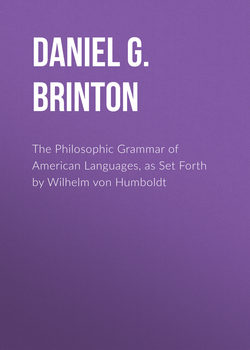Читать книгу The Philosophic Grammar of American Languages, as Set Forth by Wilhelm von Humboldt - Daniel G. (Daniel Garrison) Brinton - Страница 4
The Philosophic Grammar of American Languages
§ 4. Historical, Comparative and Philosophic Grammar
ОглавлениеThe Science of Grammar has three branches, which differ more in the methods they pursue than in the ends at which they aim. These are Historic, Comparative and Philosophic Grammar. Historic Grammar occupies itself with tracing the forms of a language back in time to their earlier expression, and exhibits their development through the archaic specimens of the tongue. Comparative Grammar extends this investigation by including in the survey the similar development of a number of dialects of the same stock or character, and explains the laws of speech, which account for the similarities and diversities observed.
Both of these, it will be observed, begin with the language and its forms, and are confined to these. Philosophic Grammar, on the other hand, proceeds from the universal constructive principles of language, from the abstract formulæ of grammatical relations, and investigates their application in various languages. It looks upon articulate speech as the more or less faithful expression of certain logical procedures, and analyzes tongues in order to exhibit the success, be it greater or less, which attends this effort. The grammatical principles with which it deals are universals, they exist in all minds, although it often happens that they are not portrayed with corresponding clearness in language.19
Philosophic Grammar, therefore, includes in its horizon all languages spoken by men; it essays to analyze their inmost nature with reference to the laws of thought; it weighs the relations they bear to the character and destiny of those who speak them; and it ascends to the psychological needs and impulses which first gave them existence.
It was grammar in this highest sense, it was the study of languages for such lofty purposes as these, with which Humboldt occupied himself with untiring zeal for the last fifteen years of his life, when he had laid aside the cares of the elevated and responsible political positions which he had long filled with distinguished credit.
19
“Les notions grammaticales resident bien plutôt dans l’esprit de celui qui parle que dans le matériel du language.” Humboldt, Lettre à M. Abel-Remusat Werke, Bd. vii, s. 396. On the realms of the three varieties of grammar, see also Dr. M. Schasler, Die Elemente der Philosophischen Sprachwissenschaft, etc., s. 35, 36, and Friedrich Müller, Grundriss der Sprachwissenschaft, Band 1, ss. 8-10 (Wien, 1876). Schasler observes that a main object in philosophic grammar is an investigation of “die genetisch-qualitativen Unterschiede der Redetheile,” that is, of the fundamental psychological differences of the parts of speech, as, what is the ultimate distinction between noun and adjective, etc.?
